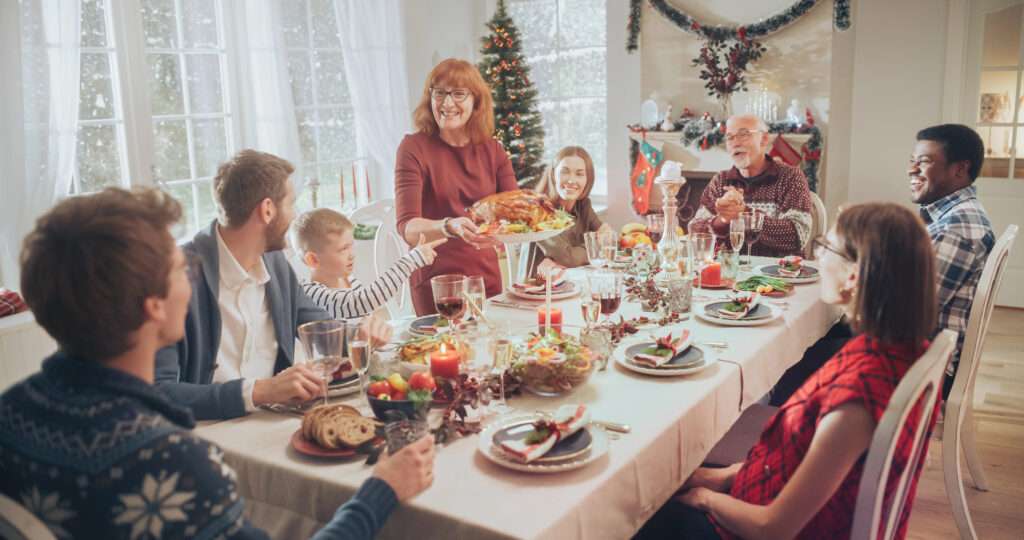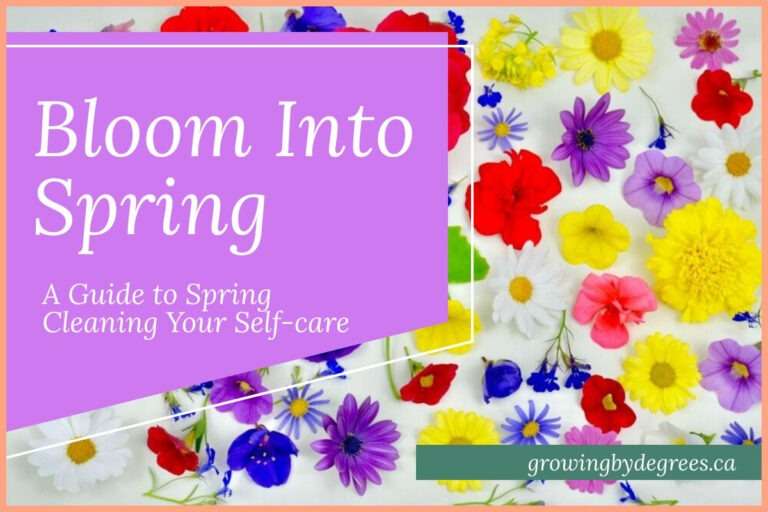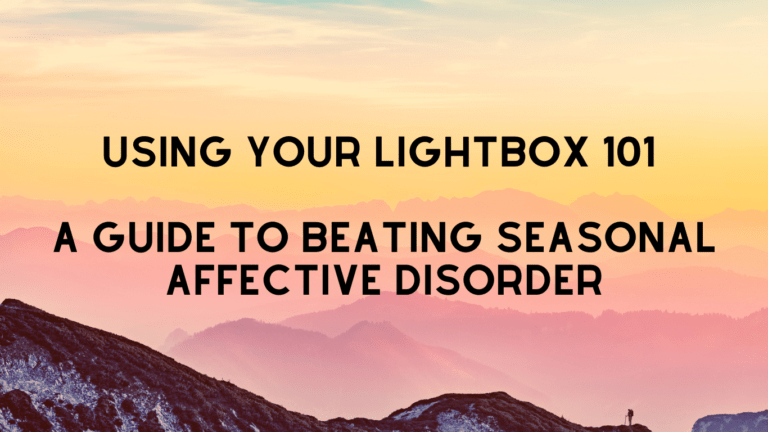
Gathering for the holidays can be tough when you’re dealing with Seasonal Affective Disorder (SAD). With twinkling lights and jolly music everywhere, these festive get-togethers can sometimes feel overwhelming rather than joyful. The balance between celebrating and managing our mental health is key to enjoying this season.
We can try a few strategies to help us enjoy the festivities without feeling overwhelmed. One way is to create a plan before heading into these gatherings. This might mean setting boundaries for how long we stay or having a trusted friend by our side.
Honouring our emotions and acknowledging any grief is also important. It might be helpful to create spaces where we can remember and celebrate loved ones we’ve lost. Together, we can make these celebrations meaningful and welcoming for everyone.
Understanding Seasonal Affective Disorder (SAD)
I don’t know about you but sometimes I feel just too tired to enjoy Thanksgiving or Christmas. I have lots of great ideas but not the energy to carry them out. As the festive season approaches, many of us may experience changes in our mood and energy levels. It’s important to recognize how these changes, often related to Seasonal Affective Disorder (SAD), can affect our mental health and overall well-being, especially during celebrations.
Recognizing SAD Symptoms
SAD is a type of depression that follows a seasonal pattern. We might notice that our mood starts to dip as the days get shorter and colder. Common signs include feeling sad or hopeless, losing interest in activities we used to enjoy, and changes in sleep or appetite.
It’s also common to feel irritable or tired. We might find it hard to concentrate, or some of us may withdraw from social activities. These symptoms can make enjoying the holidays more challenging. Keeping an eye on these changes can help us address them early.
The Impact of SAD on Well-Being During the Holidays
During the holiday season, we often face added stress from social gatherings and celebrations. For those of us with SAD, these events can feel overwhelming. The pressure to be cheerful can clash with how we’re really feeling inside.
The combination of less daylight, colder weather, and high expectations can stir up emotions like anxiety or loneliness. It’s a time when our mental health might need extra attention. Acknowledging these challenges can help us find joy and balance during this festive time. Staying connected with others and reaching out for support are great steps to take.
Preparing for the Festive Season with SAD
As we step into the holiday season, it’s important to pay attention to our mental health, especially if we’re dealing with SAD (Seasonal Affective Disorder). Let’s explore how we can set realistic expectations and plan effective self-care strategies during this time.
Setting Realistic Expectations
The festive period often brings pressures to be social and joyful. For those of us with SAD, this can feel overwhelming. It’s important that we set realistic expectations for ourselves. We don’t have to attend every event or gather with every friend and family member. Choosing quality over quantity helps us manage our energy better.
We should practice saying no when needed. Setting boundaries with our time and energy preserves our well-being. Let’s communicate openly with loved ones about our needs. It’s okay to let others know if we need a quiet night instead of a party.
Being gentle with ourselves if we don’t meet every social expectation is crucial. We can’t control how we feel, but we can control how we respond to it. Finding joy in small, simple moments can help make the holiday season more manageable.
Planning Self-Care Strategies

We need to build self-care into our holiday plans. Prioritizing self-care doesn’t mean we are being selfish; it means we are being smart. Whether it’s scheduling regular exercise, enjoying a soothing bath, or sitting quietly with a book, these moments refuel us.
During the festive season, let’s make sure to get enough sleep. Rest is vital for our mental health. Setting a regular sleep schedule can help us feel more balanced and energized. Additionally, spending some daylight time outside can boost our mood.
Let’s also consider talking to a trusted friend or a mental health professional. Support from others can be comforting. Sharing our worries can lighten the load, and getting advice can offer new ways to cope with SAD during this bustling time.
Creating a Support System
When we face Seasonal Affective Disorder (SAD), having a good support system can make a big difference. We don’t have to go through it alone. Let’s gather friends, family, or even support groups who understand what we’re experiencing. These people can offer a listening ear or a warm hug.
Make a List
Creating a list of people we can call, text, or meet helps in feeling connected. It could be a family member, friend, or even a therapist. This list is our go-to when we need to reach out.
Plan Regular Check-Ins
We can schedule regular chats or coffee dates. It’s a simple way to stay in touch and ensures we have ongoing support. We can set reminders on our phones to make it easier.
Join Online Groups
Joining an online group such as the Seasonal Affective Disorder (S.A.D.) Community can be comforting. We can find others who understand and share their experiences. It’s a space where we’re not alone and can talk openly.
Encourage Positive Activities
Sometimes, we might need a nudge to get up and do something fun. Our support system can encourage us to engage in activities that lift our spirits, like going for a walk or watching a funny movie together.
Having people around who care about us makes dealing with SAD a bit easier. It reminds us that we’re not alone in these feelings. Together, we can find ways to bring a little more light into our days.
Navigating Social Gatherings

During festive gatherings, we often face challenges like anxiety and loneliness. It’s important to balance our needs with societal expectations. Let’s explore some tips on managing these situations effectively.
Coping Strategies for Social Events
Social gatherings can be overwhelming. To ease anxiety, we can plan ahead. Preparing a few conversation topics and knowing the event’s details can help us feel more in control.
Deep breathing and positive affirmations can also be useful. Before entering a room full of people, let’s pause and take slow, deep breaths. Reminding ourselves that we’re doing well can boost our confidence. If socializing feels tiring, we can take short breaks to recharge.
Finally, focusing on meaningful connections rather than small talk helps us feel grounded. Seeking out a friendly face or someone we trust can make a big difference.
Managing Loneliness and Societal Pressure
Even in crowds, loneliness can creep in. Recognizing our feelings allows us to address them. We shouldn’t hesitate to talk to someone we trust about how we feel.
Societal pressure to appear cheerful is common. It’s okay to not feel our best during celebrations. Setting realistic expectations for ourselves is vital. We don’t have to meet everyone’s expectations.
Engaging in activities we enjoy can uplift us. Whether it’s a quiet walk or spending time with a pet, doing things we love can ease loneliness. Gratitude journaling might also help us focus on the positives.
Maintaining Boundaries with Grace
Boundaries keep us emotionally safe. If certain topics make us uncomfortable, we can gently steer the conversation elsewhere. “Let’s talk about something else”, said with a smile, can work wonders.
It’s also okay to decline invitations. Rather than making excuses, we might say, “I’m focusing on self-care, but thanks for asking.” This way, we maintain relationships without overcommitting.
We should listen to our limits. If we need to leave early, it’s alright to do so. Protecting our mental health is important, and setting boundaries means having more energy for the things that truly matter.
Honouring Memories and Grief During Celebrations
When we gather for festive occasions, feelings of grief and memories of lost loved ones can become more poignant. We can find ways to honour those we’ve lost while also finding strength and healing.
Honouring Loved Ones While Grieving
Creating small rituals to remember our loved ones can help keep their spirit present. We might light a candle in their memory or set a place at the table for them. Sharing stories about them can also be comforting. It’s important to talk about the happy and meaningful moments we shared.
Engaging our family and friends in these memories can make the experience more supportive. Through these acts, we find comfort in keeping their memory alive.
Finding Resilience in Remembrance
Remembering those we’ve lost can be both painful and healing. By openly talking about our emotions and embracing our grief, we can grow stronger. Journaling or writing letters to a lost loved one can help us process our feelings.
Self-compassion is key during this time. It’s okay to feel sad, but we can also celebrate the resilience we show by making it through tough times. Let’s focus on how their memories inspire us to live fully.
Seeking Professional Support When Needed
Sometimes, memories and grief can feel overwhelming. If this happens, seeking professional support can be beneficial. Therapy or grief counselling provides a safe space to explore our feelings. These professionals can guide us in managing our grief and finding healthy ways to cope.
We shouldn’t hesitate to reach out for help if we’re struggling. Connecting with grief support groups can offer shared experiences and understanding. We’re not alone, and there are resources ready to support us through our journey.






